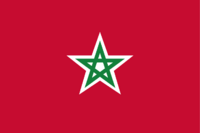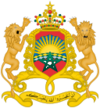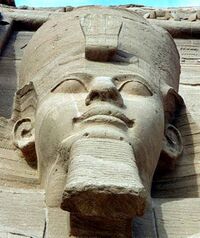Abbara: Difference between revisions
No edit summary |
No edit summary |
||
| (17 intermediate revisions by the same user not shown) | |||
| Line 1: | Line 1: | ||
{{Infobox country | {{Infobox country | ||
|micronation = <!--yes if a micronation--> | |micronation = <!--yes if a micronation--> | ||
|conventional_long_name = Duradom of Abbara <br> | |conventional_long_name = Duradom of Abbara <br> ⴰⴱⴲⴰⵕⴰ <!--Formal or official full name of the country in English--> | ||
|native_name = <!--Country's name (usually full name) in its native language, hence in italics (double quotemarks)--> | |native_name = <!--Country's name (usually full name) in its native language, hence in italics (double quotemarks)--> | ||
|common_name = Abbara <!--Common name in English (used for wikilinks, captions, and to produce a default iso3166 code)--> | |common_name = Abbara <!--Common name in English (used for wikilinks, captions, and to produce a default iso3166 code)--> | ||
| Line 15: | Line 15: | ||
|symbol_type = <!--emblem, seal, etc (if not a coat of arms)--> | |symbol_type = <!--emblem, seal, etc (if not a coat of arms)--> | ||
|symbol_footnote = <!--optional reference or footnote for the symbol caption--> | |symbol_footnote = <!--optional reference or footnote for the symbol caption--> | ||
|national_motto = ' | |national_motto = 'ⵇⵔⴻⵝⴻⵀⵜ ⴻⵓⵔ ⵍⴰⵓⴺ' <!--in inverted commas and wikilinked if link exists--> | ||
|englishmotto = 'Protect our land' <!--English language version of motto--> | |englishmotto = 'Protect our land' <!--English language version of motto--> | ||
|national_anthem = <!--in inverted commas and wikilinked if link exists--> | |national_anthem = <!--in inverted commas and wikilinked if link exists--> | ||
| Line 21: | Line 21: | ||
|other_symbol_type = <!--Use if a further symbol exists, e.g. hymn--> | |other_symbol_type = <!--Use if a further symbol exists, e.g. hymn--> | ||
|other_symbol = | |other_symbol = | ||
|image_map = | |image_map = [[File:Screenshot 2021-06-28 171811.png|200px]] <br> Abbara locally <br> [[File:Screenshot 2021-06-28 173705.png|200px]] <br> Abbara in comparison to Olivacia <!--e.g. LocationCountry.svg--> | ||
|loctext = <!--text description of location of country--> | |loctext = <!--text description of location of country--> | ||
|alt_map = <!--alt text for map--> | |alt_map = <!--alt text for map--> | ||
| Line 28: | Line 28: | ||
|alt_map2 = <!--alt text for second map--> | |alt_map2 = <!--alt text for second map--> | ||
|map_caption2 = <!--Caption to place below second map--> | |map_caption2 = <!--Caption to place below second map--> | ||
|capital = Surablanca <!--Name of country/territory's capital, wikilinked if link exists--> | |capital = [[Surablanca]] <!--Name of country/territory's capital, wikilinked if link exists--> | ||
|coordinates = <!-- Coordinates for capital, using {{tl|coord}} --> | |coordinates = <!-- Coordinates for capital, using {{tl|coord}} --> | ||
|largest_city = [[Surablanca]] <!--Name of country/territory's largest city. Use "capital" (without quotation marks) if it's the capital.--> | |largest_city = [[Surablanca]] <!--Name of country/territory's largest city. Use "capital" (without quotation marks) if it's the capital.--> | ||
| Line 37: | Line 37: | ||
|regional_languages = <!--Languages recognised or associated with particular regions within the country/territory--> | |regional_languages = <!--Languages recognised or associated with particular regions within the country/territory--> | ||
|languages_type = <!--Use to specify a further type of language, if not official, national or regional--> | |languages_type = <!--Use to specify a further type of language, if not official, national or regional--> | ||
|languages = | |languages = Abbaric (ⴰⴱⴱⴰⵕⵉⴿ) <!--Languages of the further type--> | ||
|languages_sub = <!--Is this further type of language a sub-item of the previous non-sub type? ("yes" or "no")--> | |languages_sub = <!--Is this further type of language a sub-item of the previous non-sub type? ("yes" or "no")--> | ||
|languages2_type = <!--Another further type of language--> | |languages2_type = <!--Another further type of language--> | ||
| Line 129: | Line 129: | ||
}} | }} | ||
(((((NO LONGER CANON)))) | |||
'''Abbara''' (Abbaran Arabic: '''ⴰⴱⴲⴰⵕⴰ''') is a sovereign nation in [[Olivcacia]]. Lead by the Al-Aziz family, the current Dura is [[Muhamad Al-Aziz VI]], who is the absolute ruler of the nation. Abbara is bordered by [[Eastarland]] to the west and sharing a maritime border with [[Seaview]]. The nation is made up of 4 million inhabitants, who are a majority [[Kurranism|Kurranists]]. The national language of Abbara is Abbaric. The capital and largest city is the cultural city of [[Surablanca]], one of the oldest and most colourful cities in the world. | |||
Abbara are not members of any major international groups, and have few formal foreign relations. They are seen as a low-level global power. | |||
==Etymology== | ==Etymology== | ||
==History== | ==History== | ||
===Ubian Civilisation (2000BC-100AD)=== | |||
[[File:King Khatorum.jpg|200px|thumb|left|Statue of King Kahtokurum]] | |||
The first human civilisation in Abbara was the Ubian Civilisation. The first evidence of their presence in the region dates back to around 2000BC, in old coins and pots. They likely arrived from other areas along the modern sea that runs through the north of the nation. These people followed a simple system of life, where they got what they earned from working. Evidence also suggests that the Ubians were one of the first [[Anteria]]n nations to utilise currency. They were only thought to have been active in what is now northern Abbara, and did not go further south into the desert regions. | |||
They used a monarchist system for the time they ruled over the area, and were successful. Most famously, [[King Kahtokurum]], who's mummified body was finally found in 1956. They had an organised military from around 1000BC and were one of the first civilisations to use irrigation for food and water. | |||
The downfall of the Ubians came when a major drought occured in around 90BC, weakening them extremely as it cut off a majority of their food and water supply, causing people to dehydrate in mass numbers and a famine began. | |||
===The First Duardom of Abbara (100AD-1775)=== | |||
===Vultesian protectorate (1775-1903)=== | |||
===Abbaran Confederacy (1903-1931)=== | |||
===Duardom of Abbara (1931-Present)=== | |||
==Foreign Relations== | ==Foreign Relations== | ||
==Famous Citizens== | |||
*[[Ali Sibari]], Crime lord | |||
*[[Muhamad Al-Aziz VI]], Dura | |||
Latest revision as of 18:03, 5 August 2021
Duradom of Abbara ⴰⴱⴲⴰⵕⴰ | |
|---|---|
| Motto: 'ⵇⵔⴻⵝⴻⵀⵜ ⴻⵓⵔ ⵍⴰⵓⴺ' 'Protect our land' | |
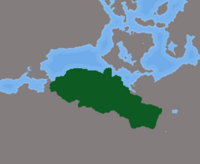 Abbara locally 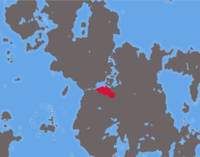 Abbara in comparison to Olivacia | |
| Capital and City | Surablanca |
| Other languages | Abbaric (ⴰⴱⴱⴰⵕⵉⴿ) |
| Ethnic groups | Abbaric (99%) Other (1%) |
| Religion | Kurranism (88%) Christianity (10%) Judaism (1%) Other (1%) |
| Demonym(s) | Abbaran |
| Government | |
• Dura | Muhamad Al-Aziz VI |
| Legislature | Al-Aziz Family |
| Population | |
• 2021 estimate | 4,750,000 |
• 2018 census | 4,732,908 |
| GDP (PPP) | 2021 estimate |
• Total | $122.458 billion |
| GDP (nominal) | estimate |
• Per capita | $3,441 |
| Gini | 40.7 medium |
| HDI | medium |
| Currency | Dirham |
| Driving side | right |
| Calling code | +287 |
(((((NO LONGER CANON))))
Abbara (Abbaran Arabic: ⴰⴱⴲⴰⵕⴰ) is a sovereign nation in Olivcacia. Lead by the Al-Aziz family, the current Dura is Muhamad Al-Aziz VI, who is the absolute ruler of the nation. Abbara is bordered by Eastarland to the west and sharing a maritime border with Seaview. The nation is made up of 4 million inhabitants, who are a majority Kurranists. The national language of Abbara is Abbaric. The capital and largest city is the cultural city of Surablanca, one of the oldest and most colourful cities in the world.
Abbara are not members of any major international groups, and have few formal foreign relations. They are seen as a low-level global power.
Etymology
History
Ubian Civilisation (2000BC-100AD)
The first human civilisation in Abbara was the Ubian Civilisation. The first evidence of their presence in the region dates back to around 2000BC, in old coins and pots. They likely arrived from other areas along the modern sea that runs through the north of the nation. These people followed a simple system of life, where they got what they earned from working. Evidence also suggests that the Ubians were one of the first Anterian nations to utilise currency. They were only thought to have been active in what is now northern Abbara, and did not go further south into the desert regions.
They used a monarchist system for the time they ruled over the area, and were successful. Most famously, King Kahtokurum, who's mummified body was finally found in 1956. They had an organised military from around 1000BC and were one of the first civilisations to use irrigation for food and water.
The downfall of the Ubians came when a major drought occured in around 90BC, weakening them extremely as it cut off a majority of their food and water supply, causing people to dehydrate in mass numbers and a famine began.
The First Duardom of Abbara (100AD-1775)
Vultesian protectorate (1775-1903)
Abbaran Confederacy (1903-1931)
Duardom of Abbara (1931-Present)
Foreign Relations
Famous Citizens
- Ali Sibari, Crime lord
- Muhamad Al-Aziz VI, Dura
